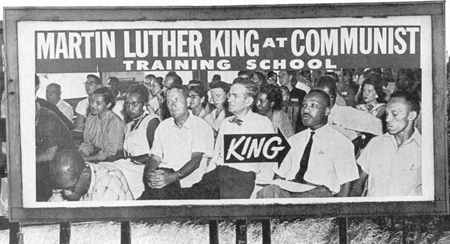A school for subversives and Communists?
How would you like to have attended the same school that Rosa Parks, Eleanor Roosevelt, Pete Seeger, Woody Guthrie, Martin Luther King Jr., Andrew Young, and Fanny Lou Hamer all attended?
That would be Highlander Folk School, near Monteagle, TN, for many years the only place in the South where white and African-American adults could live and work together, something that was illegal in that strictly segregated society. The 1950s brought Highlander to national attention, as civil rights legends and social activists learned the ways of non-violent protest there in the school’s “Citizenship School Program.” Rosa Parks’ participation in a Highlander workshop in the summer of 1955, 5 months before her back of the bus incident, had a crucial influence on her. And during the subsequent Montgomery bus boycott, Highlander co-founder Myles Falls Horton introduced Rosa Parks to Eleanor Roosevelt as “the first lady of the South.” Political enemies angrily erected billboards across the South showing Martin Luther King and Rosa Parks attending an integrated event at the Highlander Folk School in 1957.
Political enemies angrily erected billboards across the South showing Martin Luther King and Rosa Parks attending an integrated event at the Highlander Folk School in 1957.
But two decades earlier when the school was first begun, poor, uneducated miners learned about self-respect and self-empowerment at the school. In his autobiography, Horton wrote, "We didn't think of ourselves as working-class, or poor, we just thought of ourselves as being conventional people who didn't have any money."
Highlander, Horton once claimed, held the record for sustained civil disobedience, breaking the Tennessee Jim Crow laws every day for over forty years, until the segregation laws were finally repealed.
Horton attended Cumberland College in Tennessee, Union Theological Seminary in New York City, and studied Danish folk school models on site before opening the Southern Mountains School, in 1932. A short time later, he and co-director Don West, a Congregational minister from Georgia, changed the name to the Highlander Folk School. At Highlander the purpose of education was to make people more powerful, and more capable in their work and their lives. Horton had what he called a "two-eye" approach to teaching: with one eye he tried to look at people as they were, while with the other he looked at what they might become.
Not everyone was tickled by the Highlander formula. One anonymous Tennessee citizen wrote FBI director J. Edgar Hoover in 1936: “This school is a hot-bed of communism and anarchy. This is proven by the part taken by its members in the strikes at Harriman Tenn., Daisy Tenn. and at the present at Rockwood Tenn.” Hoover promptly opened a file, one that over the years accumulated in excess of 1,000 pages.
For his outspoken support of union, civil rights, and poor people's organizations, Horton endured arrests, threats, violence, and denunciations from industrialists, politicians, and segregationists.
Finally, in 1961, the state of Tennessee closed the school, revoked its charter, and sold off the assets at auction. During this time, many of the buildings were burned by arsonists. Undaunted, Myles Horton redesignated the folk school as a research center under a new charter and moved from Monteagle to Knoxville, and then to the present location in New Market, Tenn., where it is now known as the Highlander Research and Education Center.
sources:www.etsu.edu/cass/archives/Collections/afindaid/a598.html
http://education.stateuniversity.com/pages/2072/Horton-Myles-1905-1990.html
http://tennesseeencyclopedia.net/imagegallery.php?EntryID=H073
Related posts: "Don West background"
Originally blogged at: Appalachian History
Highland Folk School, Montagle TN, Myles Falls Horton, Don West, civil rights, adult education, appalachia, appalachian history, appalachia history, history of appalachia




4 comments:
NPR did an interesting piece on The Highlander Center a few weeks back...
http://www.npr.org/templates/story/story.php?storyId=14106495
Our poetry group, the Southern Appalachian Writers Cooperative (SAWC) gather every fall at the Highlander Center for readings and discussions on environmental topics such as coal mining. It's inspiring to know how the Highlander Folk School started and how it still hosts regional and cultural activists today.
Highlander Folk School? I feel like an idiot: I've never heard of it.
Communists, every last one of them.
Post a Comment